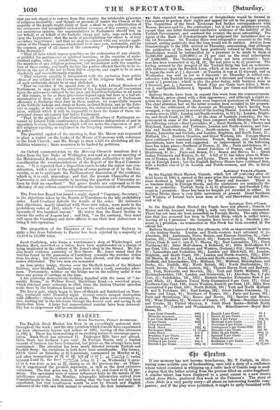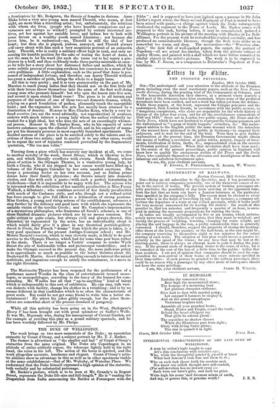441CYratrts.
If our memory has not become treacherous, Mr. T. Carlyle, in illus- trating some notable case of bookmaking, once told a story of a craftsman. whose talent consisted in whipping up a cubic inch of Castile soap to such a degree that the lather arising from the process filled an entire hogshead.. A similar talent ha* been displayed to a great extent in a new drama, called Anne Blake, produced this week at the Princess's. The story o£ Anne Blake is a very pretty story—all about an interesting humble com- panion ; and if the play were published, it might be aptly furnished with.
a frontispiece by Mr. Bedgrave, the Zeuxis of females in distress. Anne Blake loves a very nice young man named Thorold, who seems, at first sight, no more than a travelling artist; but, unfortunately, the relations with whom she lives, (people who have humble companions and go- vernesses are always so wicked!) prompted by certain interested mo- tives, set her against her amiable lover, and induce her to look with some favour on a wealthy. youth named Llaniston ' - not because she loves him, be it understood—no, Thorold is still the idol of her heart; but then she is piqued, jealous, annoyed, and Thorold always will carry about with him such a very suspicious portrait of an unknown lady. re all Thorold, who is ally a military officer high in rank, and only as- suming his humble position for the sake of testing the heart of Anne, is not the man to let his ward (for such she turns out to be) marry a gen- tleman in a huff, and thus recklessly make three parties miserable at once : so he tells her a story about her distressed father and mother, which by some subtile process of reasoning awakens her conscience to a sense of her own guiltiness. A little explanation, such as the proof that Anne is pos- sessed of independent fortune, and therefore can marry Thorold without too great a sacrifice of pride, brings the whole to a happy issue. All this is very pretty ; and it is very praiseworthy on the part of Mr. Marston to teach young ladies that they should not on the first little tiff with their lovers throw themselves into the arms of the first well-doing young man who presents himself: but why spin the lesson into five acts, and mount it upon stately blank verse ? The piece is to all intents and purposes of the nature of one of those two-act domestic dramas, which, relying on a good foundation of pathos, pleasantly touch the susceptible heart ; and the expansion into five acts has merely been attained by a diminution of density. Honour to Mrs. Charles Kean, who by a very re- fined creation (we use the word advisedly, not reproduction) of nuances, endows with much interest a young lady whom the author evidently in- tended for a high ideal, but who does the acts of an exceedingly whimsi- cal person. Honour to Mr. Charles Kean, who in his capacity of actor bestows substance upon the etherial Thorold, and in his capacity of mana- ger put his dramatis personas in most superbly furnished apartments. The decided success of the piece is to be ascribed solely to the talents and ex- ertions of these two artists ; and to ascribe it to any other cause, would be to repeat the sort of injustice rendered proverbial by the fragmentary quotation, "Sic vos non vobis."



























 Previous page
Previous page